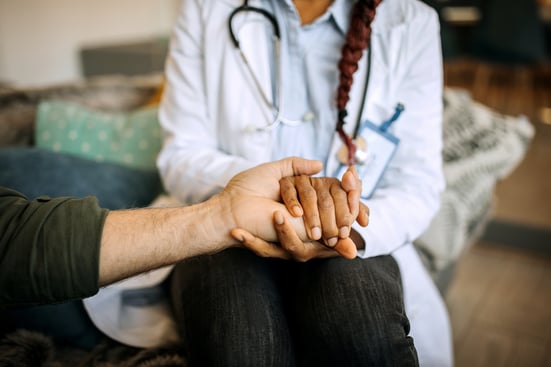"How do you know when the time is right for hospice?" There are many indications that somebody you are caring for is ready for hospice. People often think that because hospice is the final stage of the end-of-life journey, the decision to sign on to hospice can wait. No matter what the approach might be, the key to successful planning is timing. Studies have shown that when a patient is referred to hospice before their final days, they receive more benefits, live longer, and improve their quality of life
At the end of this blog you will find a button to download the Gulfside Hospice Eligibility Reference Guide which shows common concerns that may indicate it is time to discuss the option of hospice.
Starting the conversation about hospice is not easy, but the process can be less stressful with tools like the Five Wishes. The earlier a conversation about hospice care occurs, the easier transitioning to an in-care facility can be in the future. For companies like Gulfside Hospice that prioritizes the well-being of both patients and family/caregivers, these early conversations are crucial. When the clinical care team has more time to earn trust and respect from the patient and family, their end-of-life experience can be much more peaceful.

Another early hospice referral benefit is that the care team can work with a caregiver to assess how a illness will affect a patient. It is important to remember that no two conditions result in the same quality of life for every shared diagnosis. In addition to this, not every patient will have similar needs or standards for comfort care. A caregiver should ask their loved ones what their limits are and when they feel like hospice should be involved. It is beneficial to have these conversations earlier so an individual can have the freedom to choose what is best for them. Chronic illnesses that affect memory and speech make communication difficult. By understanding the limits, needs, and standards for care, a caregiver or family member can be an advocate during times when communication becomes a challenge.
In addition to discussing comfort and care, the clinical benefits of an early referral process are the following:
- Decrease the Number of Hospitalizations - When patients are seen routinely by Gulfside's clinical team, the patient's symptoms are monitored closely and are addressed before they require emergency treatment. This means fewer trips to the hospital or ER.
- Medication that is Beneficial Throughout the Treatment Plan - Constant changes in medication can be confusing and make the hospice process more complicated. Signing on to hospice early can make medication management a lot easier.
- Being able to Understand and Accomplish Life Goals - Hospice is not about dying, but about the quality of living. The job of the care team members is to assist a patient and their families in accomplishing goals before a chronic illness progresses. By enrolling in hospice early, the care team can better understand what a family and patient want to achieve before the final days.
- Managing Grief and Denial About A Recent Diagnosis - Receiving a diagnosis of chronic illness and hearing the word "hospice" as a care option can be overwhelming. It takes time to manage the heavy feelings associated with the end-of-life journey. An early referral can help the care team understand what services a family, caregiver, or patient might benefit from to ensure their mental and emotional well-being.

If you believe that hospice might be appropriate for you or your loved one, the at Gulfside Healthcare Services is available to answer your questions and start the process. Even if you're not sure if you or a loved one is ready for the next steps, our team is happy to meet with you for a services evaluation to determine how Gulfside can best serve you.
To get started, call us anytime at 800-561-4883 or visit our website to compete the online referral form at www.Gulfside.org/submit-a-referral.







